Fleurs du Mal Magazine


Or see the index
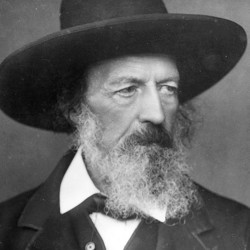
Milton
(Alcaics)
O mighty-mouth’d inventor of harmonies,
O skill’d to sing of Time or Eternity,
God-gifted organ-voice of England,
Milton, a name to resound for ages;
Whose Titan angels, Gabriel, Abdiel,
Starr’d from Jehovah’s gorgeous armouries,
Tower, as the deep-domed empyrean
Rings to the roar of an angel onset—
Me rather all that bowery loneliness,
The brooks of Eden mazily murmuring,
And bloom profuse and cedar arches
Charm, as a wanderer out in ocean,
Where some refulgent sunset of India
Streams o’er a rich ambrosial ocean isle,
And crimson-hued the stately palm-woods
Whisper in odorous heights of even.
Alfred Lord Tennyson
(1809-1892)
Milton
• fleursdumal.nl magazine
More in: Archive S-T, Archive S-T, Milton, John, Tennyson, Alfred Lord
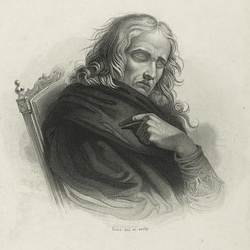
Blind Old Milton
Place me once more, my daughter, where the sun
May shine upon my old and time-worn head,
For the last time, perchance. My race is run;
And soon amidst the ever-silent dead
I must repose, it may be, half forgot.
Yes! I have broke the hard and bitter bread
For many a year, and with those who trembled not
To buckle on their armor for the fight,
And set themselves against the tyrant’s lot;
And I have never bowed me to his might,
Nor knelt before him — for I bear within
My heart the sternest consciousness of right,
And that perpetual hate of gilded sin
Which made me what I am; and though the stain
Of poverty be on me, yet I win
More honor by it, than the blinded train
Who hug their willing servitude, and bow
Unto the weakest and the most profane.
Therefore, with unencumbered soul I go
Before the footstool of my Maker, where
I hope to stand as undebased as now!
Child! is the sun abroad? I feel my hair
Borne up and wafted by the gentle wind,
I feel the odors that perfume the air,
And hear the rustling of the leaves behind.
Within my heart I picture them, and then
I almost can forget that I am blind,
And old, and hated by my fellow-men.
Yet would I fain once more behold the grace
Of nature ere I die, and gaze again
Upon her living and rejoicing face —
Fain would I see thy countenance, my child,
My comforter! I feel thy dear embrace —
I hear thy voice, so musical and mild,
The patient sole interpreter, by whom
So many years of sadness are beguiled;
For it hath made my small and scanty room
Peopled with glowing visions of the past.
But I will calmly bend me to my doom,
And wait the hour which is approaching fast,
When triple light shall stream upon mine eyes,
And heaven itself be opened up at last
To him who dared foretell its mysteries.
I have had visions in this drear eclipse
Of outward consciousness, and clomb the skies,
Striving to utter with my earthly lips
What the diviner soul had half divined,
Even as the Saint in his Apocalypse
Who saw the inmost glory, where enshrined
Sat He who fashioned glory. This hath driven
All outward strife and tumult from my mind,
And humbled me, until I have forgiven
My bitter enemies, and only seek
To find the straight and narrow path to heaven.
Yet I am weak — oh! how entirely weak,
For one who may not love nor suffer more!
Sometimes unbidden tears will wet my cheek,
And my heart bound as keenly as of yore.
Responsive to a voice, now hushed to rest,
Which made the beautiful Italian shore,
In all its pomp of summer vineyards drest,
And Eden and a Paradise to me.
Do the sweet breezes from the balmy west
Still murmur through thy groves, Parthenope,
In search of odors from the orange bowers?
Still, on thy slopes of verdure, does the bee
Cull her rare honey from the virgin flowers?
And Philomel her plaintive chaunt prolong
‘Neath skies more calm and more serene than ours,
Making the summer one perpetual song?
Art thou the same as when in manhood’s pride
I walked in joy thy grassy meads among,
With that fair youthful vision by my side,
In whose bright eyes I looked — and not in vain?
O my adorèd angel! O my bride!
Despite of years, and woe, and want, and pain,
My soul yearns back towards thee, and I seem
To wander with thee, hand in hand, again,
By the bright margins of that flowing stream.
I hear again thy voice, more silver-sweet
Than fancied music floating in a dream,
Possess my being; from afar I greet
The waving of thy garments in the glade,
And the light rustling of thy fairy feet —
What time as one half eager, half afraid,
Love’s burning secret faltered on my tongue,
And tremulous looks and broken words betrayed
The secret of the heart from whence they sprung.
Ah me! the earth that rendered thee to heaven
Gave up an angel beautiful and young,
Spotless and pure as snow when freshly driven;
A bright Aurora for the starry sphere
Where all is love, and even life forgiven.
Bride of immortal beauty — ever dear!
Dost thou await me in thy blest abode!
While I, Tithonus-like, must linger here,
And count each step along the rugged road;
A phantom, tottering to a long-made grave.
And eager to lay down my weary load.
I who was fancy’s lord, am fancy’s slave.
Like the low murmurs of the Indian shell
Ta’en from its coral bed beneath the wave,
Which, unforgetful of the ocean’s swell,
Retains within its mystic urn the hum
Heard in the sea-grots where Nereids dwell —
Old thoughts still haunt me — unawares they come
Between me and my rest, nor can I make
Those aged visitors of sorrow dumb.
Oh, yet awhile, my feeble soul, awake!
Nor wander back with sullen steps again;
For neither pleasant pastime canst thou take
In such a journey, nor endure the pain.
The phantoms of the past are dead for thee;
So let them ever uninvoked remain,
And be thou calm, till death shall set thee free.
Thy flowers of hope expanded long ago,
Long since their blossoms withered on the tree:
No second spring can come to make them blow,
But in the silent winter of the grave
They lie with blighted love and buried woe.
I did not waste the gifts which nature gave,
Nor slothful lay in the Circean bower;
Nor did I yield myself the willing slave
Of lust for pride, for riches, or for power.
No! in my heart a nobler spirit dwelt;
For constant was my faith in manhood’s dower;
Man — made in God’s own image — and I felt
How of our own accord we courted shame,
Until to idols like ourselves we knelt,
And so renounced the great and glorious claim
Of freedom, our immortal heritage.
I saw how bigotry, with spiteful aim,
Smote at the searching eyesight of the sage;
How Error stole behind the steps of Truth,
And cast delusion on the sacred page.
So, as a champion, even in early youth
I waged by battle with a purpose keen:
Nor feared the hand of terror, nor the tooth
Of serpent jealousy. And I have been
With starry Galileo in his cell —
That wise magician with the brow serene,
Who fathomed space; and I have seen him tell
The wonders of the planetary sphere,
And trace the ramparts of heaven’s citadel
On the cold flag-stones of his dungeon drear.
And I have walked with Hampden and with Vane —
Names once so gracious to an English ear —
In days that never may return again.
My voice, though not the loudest, hath been heard
Whenever freedom raised her cry of pain,
And the faint effort of the humble bard
Hath roused up thousands from their lethargy,
To speak in words of thunder. What reward
Was mine, or theirs? It matters not; for I
am but a leaf cast on the whirling tide,
Without a hope or wish, except to die.
But truth, asserted once, must still abide,
Unquenchable, as are those fiery springs
Which day and night gush from the mountain-side,
Perpetual meteors girt with lambent wings,
Which the wild tempest tosses to and fro,
But cannot conquer with the force it brings.
Yet I, who ever felt another’s woe
More keenly than my own untold distress;
I, who have battled with the common foe,
And broke for years the bread of bitterness;
Who never yet abandoned or betrayed
The trust vouchsafed me, nor have ceased to bless,
Am left alone to wither in the shade,
A weak old man, deserted by his kind —
Whom none will comfort in his age, nor aid!
Oh, let me not repine! A quiet mind
Conscious and upright, needs no other stay;
Nor can I grieve for what I leave behind,
In the rich promise of eternal day.
Henceforth to me the world is dead and gone,
Its thorns unfelt, its roses cast away:
And the old pilgrim, weary and alone,
Bowed down with travel, at his Master’s gate
Now sits, his task of life-long labor done,
Thankful for rest, although it comes so late,
After sore journey through the world of sin,
In hope, and prayer, and wistfulness to wait,
Until the door shall ope, and let him in.
William Edmondstoune Aytoun
(1813 — 1865)
Blind Old Milton
• fleursdumal.nl magazine
More in: # Classic Poetry Archive, Archive A-B, Archive A-B, Milton, John
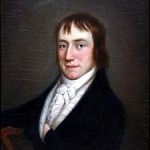
William Wordsworth
London 1802
Milton! thou should’st be living at this hour:
England hath need of thee: she is a fen
Of stagnant waters: altar, sword, and pen,
Fireside, the heroic wealth of hall and bower,
Have forfeited their ancient English dower
Of inward happiness. We are selfish men;
Oh! raise us up, return to us again;
And give us manners, virtue, freedom, power.
Thy soul was like a Star, and dwelt apart:
Thou hadst a voice whose sound was like the sea:
Pure as the naked heavens, majestic, free,
So didst thou travel on life’s common way,
In cheerful godliness; and yet thy heart
The lowliest duties on herself did lay.
William Wordsworth (1770 – 1850)
Poem: London 1802
fleursdumal.nl magazine
More in: Archive W-X, Milton, John, Wordsworth, Wordsworth, William
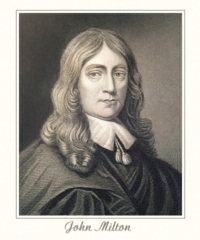
John Milton
(1608-1674)
Sonnet On his blindness
When I consider how my light is spent,
Ere half my days, in this dark world and wide,
And that one talent which is death to hide,
Lodged with me useless, though my soul more bent
To serve therewith my maker, and present
My true account, lest he returning chide,
Doth God exact day-labour, light denied?
I fondly ask; but Patience to prevent
That murmur, soon replies, God doth not need
Either man’s work or his own gifts, who best
Bear his mild yoke, they serve him best, his state
Is kingly. Thousands at his bidding speed
And post o’er land and ocean without rest:
They also serve who only stand and wait.
John Milton poetry
fleursdumal.nl magazine
More in: Archive M-N, Milton, John

John Milton
On Time
Fly envious Time, till thou run out thy race,
Call on the lazy leaden-stepping hours,
Whose speed is but the heavy plummets pace;
And glut thy self with what thy womb devours,
Which is no more than what is false and vain,
And merely mortal dross,
So little is our loss,
So little is thy gain;
For when as each thing bad thou hast entombed,
And last of all, thy greedy self consumed,
Then long Eternity shall greet our bliss
With an individual kiss,
And Joy shall overtake us as a flood;
When every thing that is sincerely good
And perfectly divine
With Truth, and Peace, and Love shall ever shine
About the supreme throne
Of him, to whose happy-making sight alone,
When once our heavenly-guided soul shall climb,
Then, all this earthy grossness quit,
Attired with stars we shall for ever sit,
Triumphing over Death, and Chance, and thee O Time.
John Milton
Op de Tijd
Vlieg Tijd, jaloers, tot waar je landing ligt,
Spoor loden uren en hun luie stappen aan
Met slechts de valkracht van hun zwaar gewicht;
Zwelg, en verslind wat door je buik kan gaan,
Al is ’t niet meer dan valsheid zonder zin,
Verderfelijk slechts en vies:
Zo klein is ons verlies,
Zo klein is jouw gewin;
Want als jij al het kwade hebt verdelgd,
En dan tot slot je gulzige zelf verzwelgt,
Dan zegent ons de eeuwigdurendheid
Met ’n kus elk toebereid,
En overspoelt ons vreugde als een vloed;
Als alles wat waarachtig is en goed
En opperst goddelijk
Steeds straalt in waarheid, vredig, liefderijk
Rondom de hoogste troon
Van Hem, wiens zaligmakende betoon
Eens onze ziel ten hemel begeleidt,
Dan zetelen wij, alle aardse grofheid kwijt,
Getooid met sterren in de eeuwigheid,
Met zeges op de Dood, het Lot en jou, O Tijd.
Vertaling; Cornelis W. Schoneveld (2012)
kempis.nl poetry magazine
More in: Archive M-N, Milton, John, More translations
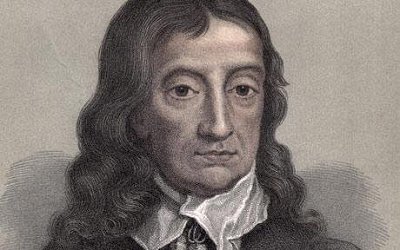
John Milton
(1608-1674 )
On Time
FLy envious Time, till thou run out thy race,
Call on the lazy leaden-stepping hours,
Whose speed is but the heavy Plummets pace;
And glut thy self with what thy womb devours,
Which is no more then what is false and vain,
And meerly mortal dross;
So little is our loss,
So little is thy gain.
For when as each thing bad thou hast entomb’d,
And last of all, thy greedy self consum’d,
Then long Eternity shall greet our bliss
With an individual kiss;
And Joy shall overtake us as a flood,
When every thing that is sincerely good
And perfectly divine,
With Truth, and Peace, and Love shall ever shine
About the supreme Throne
Of him, t’ whose happy-making sight alone,
When once our heav’nly-guided soul shall clime,
Then all this Earthy grosnes quit,
Attir’d with Stars, we shall for ever sit,
Triumphing over Death, and Chance, and thee O Time.
John Milton poetry
kempis.nl poetry magazine
More in: Archive M-N, Milton, John

John Milton
(1608-1674 )
Anno ætatis 17.
On the Death of a Fair Infant Dying of a Cough
I
O Fairest flower no sooner blown but blasted,
Soft silken Primrose fading timelesslie,
Summers chief honour if thou hadst out-lasted
Bleak winters force that made thy blossome drie;
For he being amorous on that lovely die
That did thy cheek envermeil, thought to kiss
But kill’d alas, and then bewayl’d his fatal bliss.
II
For since grim Aquilo his charioter
By boistrous rape th’ Athenian damsel got,
He thought it toucht his Deitie full neer,
If likewise he some fair one wedded not,
Thereby to wipe away th’ infamous blot,
Of long-uncoupled bed, and childless eld,
Which ‘mongst the wanton gods a foul reproach was held.
III
So mounting up in ycie-pearled carr,
Through middle empire of the freezing aire
He wanderd long, till thee he spy’d from farr,
There ended was his quest, there ceast his care.
Down he descended from his Snow-soft chaire,
But all unwares with his cold-kind embrace
Unhous’d thy Virgin Soul from her fair biding place.
IV
Yet art thou not inglorious in thy fate;
For so Apollo, with unweeting hand
Whilome did slay his dearly-loved mate
Young Hyacinth born on Eurotas strand,
Young Hyacinth the pride of Spartan land;
But then transform’d him to a purple flower
Alack that so to change thee winter had no power.
V
Yet can I not perswade me thou art dead
Or that thy coarse corrupts in earths dark wombe,
Or that thy beauties lie in wormie bed,
Hid from the world in a low delved tombe;
Could Heav’n for pittie thee so strictly doom?
Oh no? for something in thy face did shine
Above mortalitie that shew’d thou wast divine.
VI
Resolve me then oh Soul most surely blest
(If so it be that thou these plaints dost hear)
Tell me bright Spirit where e’re thou hoverest
Whether above that high first-moving Spheare
Or in the Elisian fields (if such there were.)
Oh say me true if thou wert mortal wight
And why from us so quickly thou didst take thy flight.
VII
Wert thou some Starr which from the ruin’d roof
Of shak’t Olympus by mischance didst fall;
Which carefull Jove in natures true behoofe
Took up, and in fit place did reinstall?
Or did of late earths Sonnes besiege the wall
Of sheenie Heav’n, and thou some goddess fled
Amongst us here below to hide thy nectar’d head.
VIII
Or wert thou that just Maid who once before
Forsook the hated earth, O tell me sooth,
And cam’st again to visit us once more?
Or wert thou that sweet smiling Youth!
Or that crown’d Matron sage white-robed truth?
Or any other of that heav’nly brood
Let down in clowdie throne to do the world some good.
IX
Or wert thou of the golden-winged hoast,
Who having clad thy self in humane weed,
To earth from thy præfixed seat didst poast,
And after short abode flie back with speed,
As if to shew what creatures Heav’n doth breed,
Thereby to set the hearts of men on fire
To scorn the sordid world, and unto Heav’n aspire.
X
But oh why didst thou not stay here below
To bless us with thy heav’n-lov’d innocence,
To slake his wrath whom sin hath made our foe
To turn Swift-rushing black perdition hence,
Or drive away the slaughtering pestilence,
To stand ‘twixt us and our deserved smart
But thou canst best perform that office where thou art.
XI
Then thou the mother of so sweet a child
Her false imagin’d loss cease to lament,
And wisely learn to curb thy sorrows wild;
Think what a present thou to God hast sent,
And render him with patience what he lent;
This if thou do, he will an off-spring give
That till the worlds last end shall make thy name to live.
John Milton poetry
kempis.nl poetry magazine
More in: Archive M-N, Milton, John
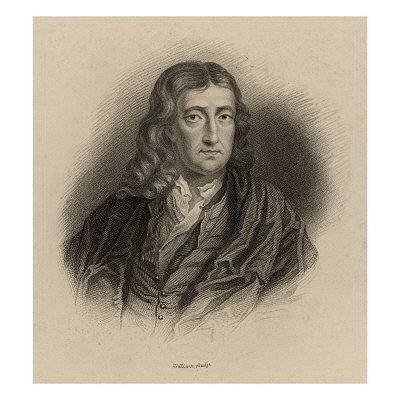
John Milton
(1608-1674 )
On the University Carrier who sickn’d in the time of his vacancy, being forbid to go to London, by reason of the Plague
Here lies old Hobson, Death hath broke his girt,
And here alas, hath laid him in the dirt,
Or els the ways being foul, twenty to one,
He’s here stuck in a slough, and overthrown.
‘Twas such a shifter, that if truth were known,
Death was half glad when he had got him down;
For he had any time this ten yeers full,
Dodg’d with him, betwixt Cambridge and the Bull.
And surely, Death could never have prevail’d,
Had not his weekly cours of carriage fail’d;
But lately finding him so long at home,
And thinking now his journeys end was come,
And that he had tane up his latest Inne,
In the kind office of a Chamberlin
Shew’d him his room where he must lodge that night,
Pull’d off his Boots, and took away the light:
If any ask for him, it shall be sed,
Hobson has supt, and ‘s newly gon to bed.
Another on the Same
Here lieth one who did most truly prove,
That he could never die while he could move,
So hung his destiny never to rot
While he might still jogg on, and keep his trot,
Made of sphear-metal, never to decay
Untill his revolution was at stay.
Time numbers motion, yet (without a crime
‘Gainst old truth) motion number’d out his time;
And like an Engin mov’d with wheel and waight,
His principles being ceast, he ended strait,
Rest that gives all men life, gave him his death,
And too much breathing put him out of breath,
Nor were it contradiction to affirm
Too long vacation hastned on his term.
Meerly to drive the time away he sickn’d,
Fainted, and died, nor would with Ale be quickn’d;
Nay, quoth he, on his swooning bed outstretch’d,
If I may not carry, sure Ile ne’re be fetch’d,
But vow though the cross Doctors all stood hearers,
For one Carrier put down to make six bearers.
Ease was his chief disease, and to judge right,
He di’d for heavines that his Cart went light,
His leasure told him that his time was com,
And lack of load, made his life burdensom,
That even to his last breath (ther be that say’t)
As he were prest to death, he cry’d more waight;
But had his doings lasted as they were,
He had bin an immortall Carrier.
Obedient to the Moon he spent his date
In cours reciprocal, and had his fate
Linkt to the mutual flowing of the Seas,
Yet (strange to think) his wain was his increase:
His Letters are deliver’d all and gon,
Onely remains this superscription.
John Milton poetry
kempis.nl poetry magazine
More in: Archive M-N, Milton, John
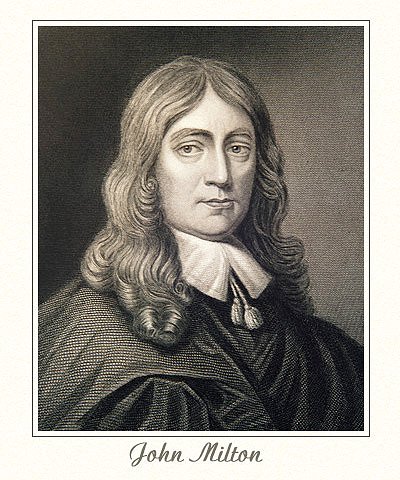
John Milton
(1608-1674)
At a Solemn Music
Blest pair of sirens, pledges of heaven’s joy,
Sphere-born, harmonious sisters, Voice and Verse,
Wed your divine sounds, and mixed power employ,
Dead things with inbreathed sense able to pierce;
And to our high-raised phantasy present
That undisturbed song of pure consent,
Ay sung before the sapphire-coloured throne
To Him that sits thereon,
With saintly shout, and solemn jubilee;
Where the bright seraphim, in burning row,
Their loud uplifted angel-trumpets blow;
And the cherubic host, in thousand choirs,
Touch their immortal harps of golden wires,
With those just spirits that wear victorious palms,
Hymns devout and holy psalms
Singing everlastingly;
That we on earth, with undiscording voice,
May rightly answer that melodious noise;
As once we did, till disproportioned sin
Jarred against nature’s chime, and with harsh din
Broke the fair music that all creatures made
To their great Lord, whose love their motion swayed
In perfect diapason, whilst they stood
In first obedience, and their state of good.
Oh, may we soon again renew that song,
And keep in tune with heaven, till God ere long,
To His celestial concert us unite,
To live with Him, and sing in endless morn of light!
1645
John Milton
Bij gewijde muziek
Brengers der hemelvreugd ons toegedacht,
Zusters der sferen, Zang en Poëzie,
Meng uw sirenenklank, versmelt uw kracht,
Dooradem dode stof met harmonie;
Geef onze hooggespannen fantasie
Die welgestemde, pure melodie,
Hem ongestoord gebracht, op zuivere toon,
Voor Zijn saffieren troon,
Met vroom gejuich en opgetogenheid;
Waar vurig rood de serafijnenstoet
Haar opgestoken hoorn luid schallen doet;
En ’t cherubijnenkoor, in duizendvoud,
De eeuwige harp bespeelt, besnaard in goud;
Waar zalige geesten bij hun zegepalm,
Heilige zang en vrome psalm
Zingen tot in eeuwigheid;
Opdat van wanklank vrij, ons aardse lied
Aan die welluidendheid recht weerklank biedt,
Zoâls ooit; tot onze mateloze schuld
d’ Natuur met dissonanten had gevuld
En de muziek der schepsels ruw verstoord,
Die steeds door d’ Allerhoogste was gehoord,
Wiens liefde hun klankenpracht was toegewijd
In de eerste staat van deugd en volgzaamheid.
Oh, zingen wij weldra opnieuw die zang,
Wijshoudend met de hemel, tot eerlang
God ons verenigt met zijn engelenkoor,
Bij Hem, voor zang in eindeloze ochtendgloor!
Vertaling Cornelis W. Schoneveld
Uit: Bestorm mijn hart, de beste Engelse gedichten uit de 16e-19e eeuw gekozen en vertaald door Cornelis W. Schoneveld, tweetalige editie. Rainbow Essentials no. 55, Uitgeverij Maarten Muntinga, Amsterdam, 2008, 296 pp, € 9,95 ISBN: 9789041740588
Kempis.nl poetry magazine
More in: Archive M-N, Milton, John, More translations
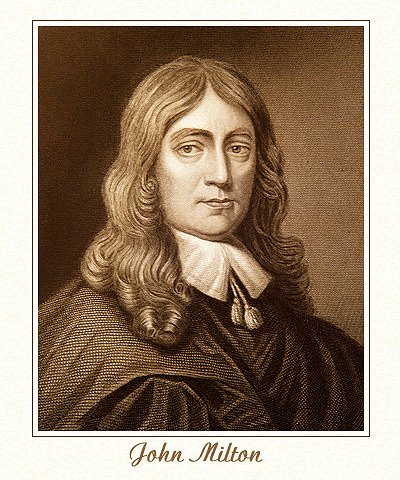
John Milton
(1608–1674)
Light
Hail holy light, ofspring of Heav’n first-born,
Or of th’ Eternal Coeternal beam
May I express thee unblam’d? since God is light,
And never but in unapproached light
Dwelt from Eternitie, dwelt then in thee,
Bright effluence of bright essence increate.
Or hear’st thou rather pure Ethereal stream,
Whose Fountain who shall tell? before the Sun,
Before the Heavens thou wert, and at the voice
Of God, as with a Mantle didst invest
The rising world of waters dark and deep,
Won from the void and formless infinite.
Thee I re-visit now with bolder wing,
Escap’t the Stygian Pool, though long detain’d
In that obscure sojourn, while in my flight
Through utter and through middle darkness borne
With other notes then to th’ Orphean Lyre
I sung of Chaos and Eternal Night,
Taught by the heav’nly Muse to venture down
The dark descent, and up to reascend,
Though hard and rare: thee I revisit safe,
And feel thy sovran vital Lamp; but thou
Revisit’st not these eyes, that rowle in vain
To find thy piercing ray, and find no dawn;
So thick a drop serene hath quencht thir Orbs,
Or dim suffusion veild. Yet not the more
Cease I to wander where the Muses haunt
Cleer Spring, or shadie Grove, or Sunnie Hill,
Smit with the love of sacred song; but chief
Thee Sion and the flowrie Brooks beneath
That wash thy hallowd feet, and warbling flow,
Nightly I visit: nor somtimes forget
Those other two equal’d with me in Fate,
So were I equal’d with them in renown.
Blind Thamyris and blind Maeonides,
And Tiresias and Phineus Prophets old.
Then feed on thoughts, that voluntarie move
Harmonious numbers; as the wakeful Bird
Sings darkling, and in shadiest Covert hid
Tunes her nocturnal Note. Thus with the Year
Seasons return, but not to me returns
Day, or the sweet approach of Ev’n or Morn,
Or sight of vernal bloom, or Summers Rose,
Or flocks, or herds, or human face divine;
But cloud in stead, and ever-during dark
Surrounds me, from the chearful waies of men
Cut off, and for the Book of knowledg fair
Presented with a Universal blanc
Of Natures works to mee expung’d and ras’d,
And wisdome at one entrance quite shut out.
So much the rather thou Celestial light
Shine inward, and the mind through all her powers
Irradiate, there plant eyes, all mist from thence
Purge and disperse, that I may see and tell
Of things invisible to mortal sight.
kempis.nl poetry magazine
More in: Archive M-N, Milton, John
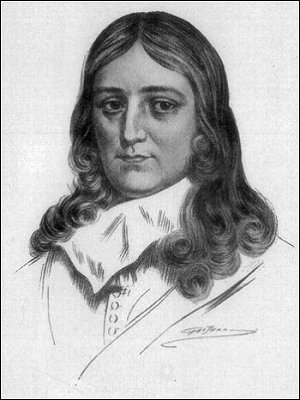
John Milton
(1608–1674)
On Time
FLY envious Time, till thou run out thy race,
Call on the lazy leaden-stepping hours,
Whose speed is but the heavy Plummets pace;
And glut thy self with what thy womb devours,
Which is no more then what is false and vain,
And meerly mortal dross;
So little is our loss,
So little is thy gain.
For when as each thing bad thou hast entomb’d,
And last of all, thy greedy self consum’d,
Then long Eternity shall greet our bliss
With an individual kiss;
And Joy shall overtake us as a flood,
When every thing that is sincerely good
And perfectly divine,
With Truth, and Peace, and Love shall ever shine
About the supreme Throne
Of him, t’whose happy-making sight alone,
When once our heav’nly-guided soul shall clime,
Then all this Earthy grosnes quit,
Attir’d with Stars, we shall for ever sit,
Triumphing over Death, and Chance, and thee O Time.
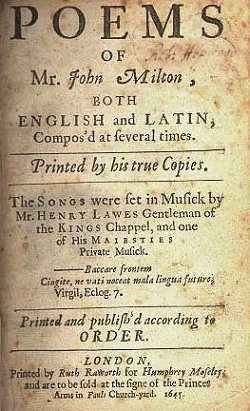
Poem of the week
July 20, 2008
More in: Archive M-N, Milton, John
Thank you for reading Fleurs du Mal - magazine for art & literature